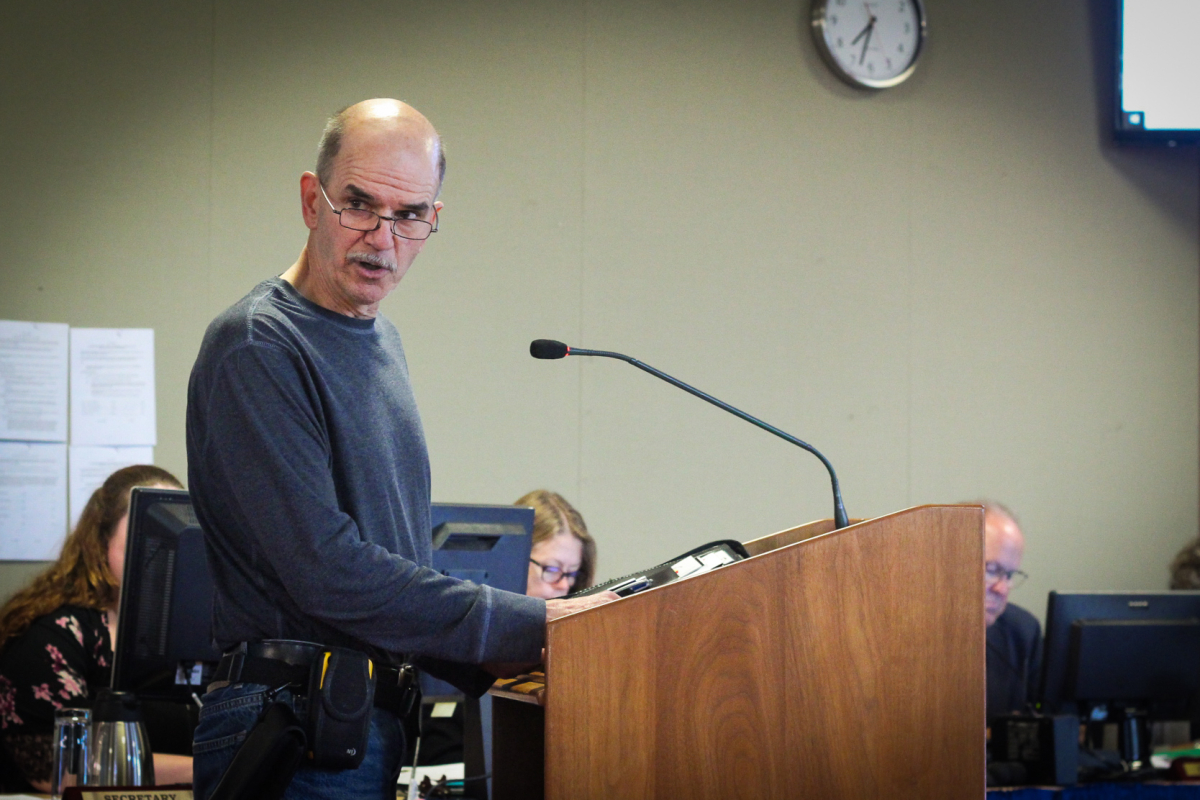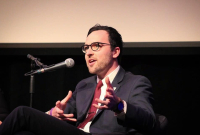Support strong Canadian climate journalism for 2025
Last week, Asiyah Robinson, a 22-year-old Muslim woman, presented an impassioned speech that woke the ghosts of an otherwise eerily stoic Victoria city council chambers. Robinson added her voice to a chorus of concerned Canadians speaking against a recent secularism bill passed into Quebec law.
If Robinson were a Quebec citizen, she couldn’t pursue a job as a teacher, lawyer, judge nor police officer while practicing her religion, wearing a hijab, as she has done since she was nine years old. A controversial new Quebec law — Bill 21: An Act respecting the secularity of the State — would prohibit her and any other public service employees in positions of authority who practiced their faith wearing a hijab, turban, kippa, cross and more from doing so, while delivering services to the public.
“First they strip you of your religion, then they take away your cultural practices, then they separate you from your community,” Robinson said. She called an attentive Victoria City Council to think back to the Quebec City mosque shooting. “On Jan. 29, 2017, there was a dreadful mass shooting at the Quebec Islamic Cultural Centre. Six were killed ... It was horrible and devastating.”
Robinson said the mosque shooting bears a chilling resemblance to the political movement in Quebec today.
“The shooting was done by one person, and thankfully, the bullets ran out... But to live in a country that proposes and promotes an institutional law that legalizes discrimination based on faith ensures a never-ending supply of ammunition that suppresses not only Muslim, but Canadian values,” Robinson said. “This will not only affect my generation but will ripple into generations to come.”

As a city, Victoria doesn't get much further from the province of Quebec, located on the west coast on Vancouver Island. Yet citizens are speaking out against Quebec's new law as if it existed in British Columbia. It's rare outrage in a country that has seen few leaders stand up and outwardly proclaim the law to be against Canadian values.
In Victoria, Robinson thanked councilor Sharmarke Dubow, who introduced a motion to city council in support of the legal opposition to Bill 21. Robinson expressed gratitude to Victoria’s city council, which voted unanimously in support of the motion.
“An attack on the constitution in one part of Canada is an attack on the constitution in any part of Canada,” Dubow told National Observer, on the way to Thursday night’s council meeting. “This new law will upend people’s lives and livelihoods — it’s textbook discrimination.”
On the other side of the country, Ontario Liberal leadership candidate Steven Del Duca was the first to ask Premier Doug Ford — who has yet to publicly speak on the issue — to denounce the Quebec bill.
“I think it’s important for all of us to see we have a premier who will stand up and say we believe in something bigger than tearing ourselves apart — and tell Quebec that it is moving in the wrong direction,” Del Duca said in an interview. “This is not the Canada I grew up in and it’s not the Canada I want my daughters to grow up in.”
'Relative silence' surrounding Quebec’s journey to a secular bill
On July 9, a man in a black suit and white gloves walked into the Quebec National Assembly and climbed a yellow ladder placed where the Speaker’s chair was meant to be. In an empty chamber, he unhooked the brown and gold crucifix against the blue wall and placed it on a table. The cross has hung in the legislature since the 1930s.
The removal was broadcast across the province, with many linking it to Bill 21, which passed on June 16, even though it was a separate issue entirely. Premier François Legault said that removing the crucifix indicated a “compromise” to Quebecers and would help unite the province over the bill.
Quebec’s secularist bill was first proposed 11 years ago and has been proposed four times in recent memory. In 2017, the Quebec Liberal Party proposed similar legislation, which briefly went into effect before being halted by an injunction from a Superior Court judge who claimed that “irreparable harm [would] be caused to Muslim women” if it continued.
Defenders of the bill, who often invoke a time of strict religious influence in Quebec before the 1960s, claim the new law is a step in the right direction toward a modern society intent on continuing to preserve and protect its linguistic and cultural identity. The law, proposed by Premier François Legault during the 2018 election and tabled by the Coalition Avenir Québec, cannot be separated from Quebec’s history of separatist politics.
Bill 21 in its current form includes amendments to allow for surveillance and discipline mechanisms to enforce the law — measures that opposition critics in Quebec have called “secular policing.” It also doubles down on pre-existing legislation that requires citizens to uncover their faces when accessing public services like municipal transit and the court system. (It still remains unclear, however, whether Indigenous Peoples will be prevented from wearing traditional regalia while teaching.)
In order to prevent this new legislation from being challenged in court for contravening Canada’s Charter of Rights and Freedoms, the government has invoked the “notwithstanding clause” — a constitutional measure that allows provinces to overrule the charter.
After sitting quietly in the Constitution for several decades, that clause has now been invoked three times in recent history: first by Saskatchewan Premier Brad Wall to override a court ruling that would have removed provincial funding from non-Catholic students attending Catholic schools; then by Ontario Premier Doug Ford to slash Toronto City Hall in half a few months before the municipal election, and now by Quebec Premier Legault.
The use of the clause is being challenged by both the National Council of Canadian Muslims and the Canadian Civil Liberties Association, which have filed a motion in Quebec’s Superior Court to seek an injunction against the law and have set out arguments before the court that say the proposed bill is “impermissibly vague.”
Few jurisdictions have supported this legal challenge; but neither has anyone outwardly denounced it. While all three major federal leaders — Prime Minister Justin Trudeau, Conservative Leader Andrew Scheer and NDP Leader Jagmeet Singh — have said they opposed the bill, they have done so quietly. Trudeau has consistently responded to questions by saying “It’s not up to politicians to tell people what to wear.”
Among provinces, Manitoba Premier Brian Pallister was the first to take a public stance on Bill 21 on July 4, saying that “there has been relative silence on this issue.”

“Here we have a piece of legislation that sends, I think, an un-Canadian message that they need to hide, or that they’re less acceptable for some reason — not just for what they wear, but for what they believe,” Pallister told The Globe and Mail. “I couldn’t stand back, as a Canadian, and as a premier, and not say that I think this is dangerous legislation.”
At the Council of the Federation in Saskatoon last week, where all 13 provincial and territorial leaders gathered, Pallister told reporters that he had broached the topic of Bill 21 individually with various premiers (he refused to name any names) and intended to bring it up with Legault as well.
“I think that when the freedoms of any of our neighbours, any of our friends in the Canadian family, are placed at risk, then we should all stand up and say that’s not right,” Pallister said in a July 12 press conference. “I’m a farm boy. I don’t like erosion… And the erosion of our rights and freedoms is also dangerous. It is also dangerous when one does nothing and watches that erosion occur.”
Also in Saskatoon, Premier Legault said he accepted Pallister’s point of view but “agrees to disagree.”
"I think what's happening in Quebec should be under the responsibility of Quebec premiers and Quebecers," he told reporters on July 12. "That's it."
National Observer surveyed all 12 premiers individually (minus Legault) about their positions on Bill 21, and received only four responses.
Commenting on it for the first time, Premier Ford denounced the bill in a short statement: “Our Government is for the people, all the people. As Premier, I will always protect an individual’s fundamental rights — including religious freedom and freedom of expression. A similar law has no place in Ontario.”
Alberta Premier Jason Kenney’s spokesperson referred National Observer to his statement in the legislature from June 19, where he said that he had conveyed his opposition to the bill to Legault. “I think I speak for the vast majority of Albertans in saying that we believe in religious freedom and that that religious freedom should be protected; for example, for public servants wearing ostensible religious symbols,” Kenney told the legislature.
The office of Nova Scotia Premier Stephen McNeil also sent a short statement: “We would not consider similar legislation in Nova Scotia. We are proud to be a welcoming, inclusive province where diversity is celebrated.”
And Ravi Kahlon, British Columbia’s parliamentary secretary for multiculturalism, responded in Premier John Horgan’s stead: “In British Columbia, we know that the diversity of our citizens makes us a more vibrant and stronger society. The first RCMP officer to wear a turban was in B.C. and rather than harm society, this encouraged others to serve their communities. We have much more work to do in addressing continued discrimination in our society. We will never use the tools of government to shut out some people from certain jobs due to expressions of their faith.”
Silence feels like ‘tacit approval of what’s going on’
Naseem Mithoowani had a chilling flashback when she first heard about the proposal of Bill 21. She felt blindsided by its passage: It felt like Canada had taken huge steps backward.
The Urban Alliance for Race Relations board member was the immigration lawyer who defended Zunera Ishaq’s right to wear the niqab at her citizenship oath ceremony four years ago, months before the federal election that put Justin Trudeau in office.
“I thought we had reached an understanding that we weren’t going to tell marginalized populations, particularly women, what to do," said Mithoowani. I thought we had realized that was a bad idea."
“This feels like a loop: that we’re seeing the same thing again and again, in different variations,” she added.
Mithoowani said she is disappointed by the lack of outrage coming from Canada’s leadership, sensing that it is coming from “a lack of understanding that even though (Bill 21) is happening in Quebec, it’s affecting all Canadians.”
It almost feels like “tacit approval of what’s going” from Canada’s leadership, she said.
Thus far, only municipalities have taken charge. The city council of Brampton (Canada’s ninth largest city and home to a large south Asian population, many of whom identify as Sikh) was the first to unanimously vote in favour of a motion to join the legal fight against Bill 21, with the support of the regional police board. The council also voted in favour of a second motion that would see the city advertise firefighting and emergency service job opportunities in Quebec.
“Brampton is Canada's most diverse big city. And if Brampton's not going to defend Canadian multiculturalism, then who is?" Mayor Patrick Brown told council. He also called the new Quebec legislation "a trampling of a basic Canadian right."
Along with Brown and Pallister, Liberal MPP (and former minister responsible for anti-racism) Michael Coteau has also urged Premier Ford to make Ontario's opposition to Bill 21 clear, saying in a statement that "it is simply wrong for any government to impose its views on its citizens and to limit the right for religious Canadians to wear the symbols of their faith."
Victoria City Coun. Dubow’s motion voiced support, on behalf of the city council, for the legal action against the bill. Dubow said Quebec’s secularism law sends a clear message to young Sikhs, Muslims, Jews, Christians and people of diverse faiths that they are not welcome in Quebec.
“The bill creates a second-class citizen in Quebec, discriminating against minorities, simply because of how they express their faith,” Dubow said.“The bill will have far-reaching consequences for communities while anti-semitism, anti-Muslim hate and other forms of racism are on the rise.”
Jatinder Singh, a member of the Sikh community in Victoria, agrees.
“The law is intentionally vague and the use of inspectors to enforce it is both troubling and fearsome,” Singh told the council. “Bill 21 is not some timid law designed to fix some problem or improve lives. It is blatant prejudice.”

Mithoowaani said it’s more than prejudice, arguing that Bill 21 creates a precedent. It’ll seep into online culture and create targets for visible minorities outside Quebec, she said, citing what happened when the niqab ban was proposed by the Harper government in 2015.
The “knee-jerk to say, ‘Oh, well Canadians aren’t vulnerable to hate...This is just a Quebec phenomenon’ is not helpful, and it's not grounded in reality,” she said.
“This is in our own backyards,” she said. “And the fact that there's not more outrage about basic human rights being stripped and a culture that's being created of division and hatred should be top of mind for everyone because that threatens the very core identity as Canadians.”
Ontario Liberals leadership candidate Steven Del Duca believes that more than denouncement is needed to ensure Quebec's Bill 21 is not replicated elsewhere in Canada. In a letter to Ford, Del Duca urges the premier to take decisive action to protect minority rights including recalling the legislature (which is on break till October) to pass a motion condemning the bill; increase funding at the Ontario Human Rights Legal Support Centre; and, amend the provincial Human Rights Code "to explicitly protect every Ontarian's right to wear clothing or other personal effects they believe to be religiously mandated."
Actions like these "send a very clear message that the province is taking a clear and decisive position with respect to the values that we hold dear," Del Duca said. "I think it's important for all of us to see that we have a premier who will stand up and defend their interests, who will stand up and say we believe in something bigger than then trying to tear ourselves apart and Quebec is moving in the wrong direction. And Doug Ford has a really wonderful opportunity to step up and do the right thing."
Hate crimes against Muslims have risen in Canada over the last few years, especially in Ontario and Quebec. Statistics Canada reported a 47-per-cent increase in police-reported incidents from 2016 to 2017. Quebec reported a 50-per-cent increase in the same period, urging the National Council of Canadian Muslims to create a hate crime map, to track anti-Muslim incidents.
Bill 21 could fuel this, Mithoowaani said. It is creating “a climate of intolerance and a climate of division and a climate then that puts certain populations at risk.”
“And I'm not sure that that aspect of it is fully appreciated ... I don't know that our leadership has really understood that,” she said, pausing before adding, “That there'll be sort of a following of suit.”
‘I think we're naive in thinking that these (Canadian) values we celebrate are just innate’
At a conference in Paris earlier this month, Quebec Education Minister Jean-François Roberge posed for a photo with Nobel Peace Prize laureate Malala Yousafzai. Journalist Salim Valji asked Roberge on Twitter how he would respond if Yousafzai, an internationally celebrated activist who was shot in the head by the Taliban for promoting women’s right to education and is currently studying one of the most prestigious degrees at Oxford University, wanted to teach in Quebec.
Roberge, who as education minister would be responsible for enforcing Bill 21 in schools, said it would be an immense honour, but that the use of religious symbols are still not welcome.

The bill has put school board after school board against the Quebec government, with several refusing to implement the bill and the government saying the law is the law and any delays “will not be tolerated.”
Masses of people have taken to the streets to protest the bill, too.
“I think we're naive in thinking that these (Canadian) values we celebrate are just innate, and they don't need to be cultured and they don't need to be protected, that they'll just always be who we are,” Mithoowaani said. “That's only true if we actively make that choice.”
In Calgary the I-CARE (Interfaith Community Approach Resisting and Eliminating hate, racism and violence) taskforce — a group consisting of members of more than 50 organizations and faith-based groups that was created in response to the Christchurch mosques shooting in New Zealand and rising rates of hate crimes in Canada and around the world — agreed to conduct a research study into the genesis of hate and the fall-out from the bill.
During last week’s council meeting in Victoria, one man added his name to the speaker list, wishing to give “Quebecois a voice” in a room otherwise in stark opposition to the bill.
Richard Bouchard was born and raised in Montreal, but has been living in Victoria for the past 25 years. Bouchard said he thinks a large segment of the Canadian population have difficulty understanding “the people of La Belle Province.”
“The aim of Bill 21 is to enshrine the principle of secularism in Quebecois and to protect the fabric of a Francophone society in a globalizing and largely anglophone world,” Bouchard said. “Allow me to inform you that the Quebecois are not only in favour of the charter of secularism, but they hold it dearly.”

Quebecois aren’t xenophobic or racist, Bouchard said.
“We all agree that Canada is one of the best and most beautiful places in the world to live, especially compared to many of the countries our immigrants come from, who all see a better future for their families,” he continued.
Bouchard compared the control of the Roman Catholic Church in Quebec to the fundamentalist group the Taliban. Generations of extreme religious control in the province gave rise to the fight for secularism, he said, and allowing religious symbols in public spaces would be taking a step backwards.
Asiyah Robinson, who had explained her hijab as not only a religious symbol but part of her identity, sat quietly behind Roberge. She listened with a group of Muslim women as he spoke of the threat of seeing “some teacher wearing a hijab to perhaps demonstrate their belief and send an overt message, such as, you see, I’m fully engaged in my faith, what about you?”
Editor's note: This article was updated at 4:43 p.m. ET on July 16 to clarify that Quebec Bill 21 places restrictions to public servants in positions of authority while they are delivering services to or dealing directly with members of the public. It was updated again at 1:09 p.m. ET on July 17 to add a quote from Liberal MPP Michael Coteau and correct the number of times the notwithstanding clause has been used in recent years.








Comments
So does that mean that nuns in habit can't teach in publicly funded Catholic schools in Quebec?
Or that First Nations schools there will not be able to display symbols of First Nations spirituality?
I have zero problem with government buildings having no religious symbols, including crucifixes, plaques bearing the Ten Commandments, etc. Ditto re any other religious ornamentation on exteriors or interiors of government buildings, or on stationery, etc. of publicly funded institutions. I don't think, say, swastikas are appropriate either. Or symbols of other ideologies or religions, however peaceable or positive they might be.
But when it gets down to *wearing* things ... clothing or jewellery ... I wonder, then if all Roman Catholic civic workers will have to bare their chests each day to show they are not wearing a cross next to their skin? Jewish people be disallowed, if they would choose, wearing a star of David?
Bill 21, as others have stated, simply an adjunct to racism, and I'm wondering what they'll do about the garb of, say, nuns and priests. After all, they do enjoy public support in terms of tax exemptions, and outright public support to the Catholic school system.
How far will it go? Will they have to uncover their heads? Remove rings? Rosaries?
Will they have to change their names? No one named Jesus or Mary or Mohammed? Will they be barred "name" jewellery (I personally don't cotton to that sort of thing, but some people do).
If so, will it make individuals *not* in public service be targets of attack by zelot "secularists"?
This is an age in which we must be particularly unwilling to give an inch on so many things. It's difficult enough that we've gone as far down various roads as we have, and that because of globalization of trade and industry, the many "infections" attacking all people's common humanity spreads like an epidemic plague.
All hands on deck, me hearties!
As a feminist who grew up in a time when women were expected to 'cover their heads' in church and whatnot, out of some weird patriarchal idea of 'respect for the deity'........I am conflicted about this law. I do see the discrimination it visits upon orthodox religions of all kinds....but I also wonder about my right to be free from religious obsessions......and as a woman, maybe get to die in a culture that treats my body as the natural expression of divine nature.
I know how a male culture's obsession with women's bodies........and their resultant edicts around 'modesty', effects how I felt as a young woman......and I suspect that sense of free floating shame hasn't totally disappeared.......and I'd be lying if I pretended fully covered women have no effect on me. Truth is, it elicits old angers about male culture's fear of, and expropriation of women's bodies.
I also know something of the struggle western women went through to achieve some modicum of freedom from the church....the Catholic church in particular....so I wonder...?
Is this bill just about racist discrimination..........or is it also a small part of that struggle between patriarchal religious edicts and the growing impatience of people who see religion, and in particular, religious ostentation, as a threat to their freedom. Anti-abortion laws are proliferating in parts of the states, where fundamentalist religion has power. How soon before women are the targets of more general restrictions....?
I think you can only discount those fears, if you've never been a victim of male dominated religions....and you don't have to go very far back in the history of our own religious right to find those residential schools, homes for unwed mothers, sexually abusive men of the cloth.......and a whole raft of regulations that penalized women for being women.
How we allow for true religious freedom, while protecting the rights of the growing secular majority to be free of its influence seems to me to be part of this debate. I'm not able to wholeheartedly jump on the diversity bandwagon of 'religious rights' given what I know of the history of world theocracies. But that doesn't make me a racist....it makes me a historian. I'm not fond of polygamy....or female genital mutilation either, but both have been argued as items of 'religious belief'.
We need to have a deeper and broader discussion of this issue in Canada.....and include the feminist perspective.